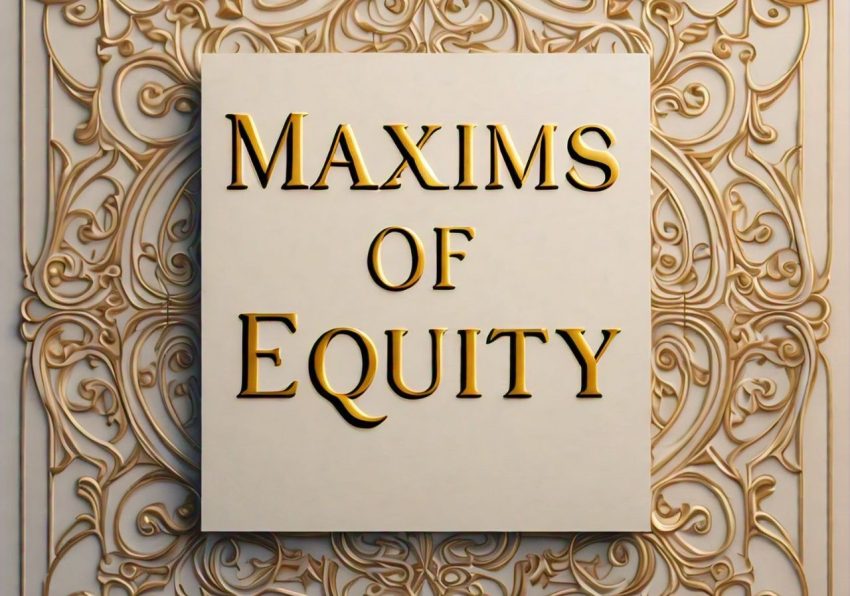3. Maxim: Where there is equal equity, the law shall prevail.
The doctrine of priority:
Priority means the right of a person to enforce a claim in preference to another person. It often happens that two or more persons have an interest in the same property. It is necessary in such cases to give preference to one of them in respect of the enforcement of their respective claims. This is done on the basis of priority.
Though there can arise no question of priority in the case of legal estates, it does arise in the case of equitable estates. This is so, because an equitable interest may exist over the same property together with another prior or subsequent legal interest.
Maxim 3: Where there is equal equity, the law shall prevail.
- This maxim means that “when the conflicting interests of two or more parties are supported by equitable pleas of equal value, equity being unable to prefer one to the other would allow the conflicting equities to cancel out and leave law to take its course”.
- It means the parties will litigate in a Court of Law where the only legal estate alone will apply.
- Where the defendant has an equal claim to the protection of a Court of Equity for his title as the plaintiff has to the assistance of the Court to assert his title, the Court will not interpose (introduce, interrupt) on either side, but will leave the matter as it stands.
- Equity is equal between persons who have been equally innocent and equally diligent.
- The purchaser, however, in all cases, must hold a legal title in order to give him full protection of his defense. He must have paid the purchase money before notice, otherwise he will not be protected.
E.g., The rule is for a vendee/buyer of real estate to claim the rights and protection of a bona fide purchaser for value, he must be able to show,
- first, that he has paid the purchase price in full,
- second, that he has so paid without notice of any prior claim or equity which would cause a defect in his title.
Only where both of these conditions existed, he hold the land free from all previous incumbrances. If any condition lacks, in whole or in part, his title will be defeated in varying degrees.
-
A legal right is enforceable against any person who takes the property, whether he has notice of it or not. (Notice of equitable right)
For instance, if A sells to C land, over which B has a right of way, C takes the land subject to B’s right, although he was ignorant of the right at the time of purchase. But the rule is different as regards equitable rights. It is a well-established rule that a purchase for valuable consideration without notice of prior equitable right, obtaining the legal estate at the time of his purchase, is entitled to priority in equity as well as at law. In such a case equity follows the law. The purchaser’s conscience not being in any was affected by the equity.
- According to this maxim, if the legal right is equal to equitable rights, the legal right shall remain there and the person bearing legal right shall precede as equity is under law.
Application: This maxim, “Where there is equal equity, the law shall prevail”, has certain applications such as:
-
The dispute in the transfer of property and breach of contract:
When both the contestants are equally entitled to obtain help from courts of equity (because their equities are equal), the party who has a law in his favor will succeed.
For example, A agrees with B to sell his property for Rs. 5,000/-. Therefore, in breach of the above agreement, A sells the property to C for Rs. 6,000/- and makes a document handing over the possession of the property to C. As a result of the agreement, B did not get any legal interest in the property. B has only an equitable interest in his favor binding A conscience. C, on the contrary, as a result of his agreement with A, gets the legal interest and has executed a document and obtained possession of the property. B’s interest is equitable with the law in his favour. Naturally, therefore, in a conflict between B and C, C has superior interest as compared to that of B. Thus, equitable interest is not as strong as a legal interest and so, according to the maxim the law shall prevail.
-
Tacking[1] (application in Pakistan):
There are three different mortgages executed in respect of the same property to X, Y, & Z respectively. The mortgagor executed on different dates and none of the parties have the notice of the prior mortgage. In such a case, the first mortgagee has a legal estate. According to the maxim where equities are equal the first in time shall prevail, and the mortgages rank in order of time.
If C, by paying off A’s mortgage, obtains the legal estate, i.e., obtains conveyance of A’s estate and an assignment of his securities, he is entitled to precedence over B and also to the first mortgage. But in case the first mortgagee does not have the legal estate, the third mortgagee acquires no priority over the second mortgagee even if he has made the payment to the first mortgagee.
This doctrine was abolished in 1925. After 1925, a legal and equitable mortgage was allowed to tack further advances to rank in priority to intervening legal or equitable mortgages. Section 80 of the Transfer of Property Act expressly prohibited it. The section enacts that when a third mortgagee pays off the first mortgagee, he is subrogated to the position of the first mortgagee. The section explains that the third mortgagee cannot join his own mortgage to the first and claim priority over the intermediate mortgagee.
-
In contradiction of legal and equitable rights:
This maxim is used where equitable and legal rights conflict and precedence goes to the legal right. Equities must be equal and there should be conflict of legal and equitable rights. It does not apply where the priority of time in the case of equity is a determinant/basic factor in relief.
-
Transfer of property cases:
It is clear in law that fraudulent transfer of property with intent to defraud or delay is voidable.
- 78 of the Transfer of Property Act 1882 is based on this maxim. It enacts that “The prior mortgagee shall be postponed to the subsequent mortgagee where through the fraud, misrepresentation, or gross neglect of a prior mortgagee, another person has been induced to advance money on the security of the mortgaged property.”
- 53 of the Transfer of Property Act is also based upon this maxim. It enacts that “every transfer of immovable property made with intent to defeat or delay the creditors of the transferor shall be voidable at the option of any creditor so defeated or delayed.”
Fraudulent transfer of property with intent to defraud or delay is voidable.
- X being heavily indebted tries to dispose of his immovable property and converts it into cash in order to defeat his creditors.
- Y being aware of all these facts, purchased such property from X.
- The sale is voidable at the option of the creditors so defeated.
- If, however, Y is not aware of the above circumstances and purchases the property in good faith, the sale would not be voidable.
- But if Y takes the property by way of gift, without paying any consideration for the same, the sale shall be voidable at the instance of the creditors regardless of the fact whether Y had or had not any notice of the intention of X to defraud his creditors.
Justice Lord Selborne held in Ewing v Orr Ewing: “Courts of equity are always supposed courts of conscience in England.” They act in personam and not in rem. They put pressure on the performance of agreements and securities even if they do not come under their jurisdiction.
Exceptions: The Court will postpone prior legal estate to a subsequent equitable. This maxim has certain exceptions as follows:
- Where the owner of the legal estate has assisted in or connived at the fraud which has led to the creation of a subsequent equitable estate without notice of the prior legal estate.
- Where the legal estate is subsequent to the equitable interest, it cannot be given priority if the legal owner takes the estate with notice of the prior equitable estate.
- Where the legal estate is prior to the equitable estate, the legal owner will not be entitled to priority if he participates in fraud or gross negligence.
- Equal equities without legal right: Where there are equal equities but a legal right lacks, this maxim shall not apply.
Maxim 3: “Where there is equal equity, the law shall prevail” should be read with Maxim 4. “Where the equities are equal, the first in time shall prevail” for proper understanding of both the maxims.
Read also: Maxim 2: Equity follows the law. https://shariahandlaw.com/equity-follows-the-law/
[1] Tacking is a legal concept arising under the common law relating to competing priorities between two or more security interests arising over the same asset.


1 thought on “3.Where there is equal equity, the law shall prevail.”